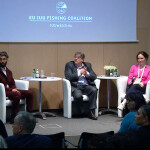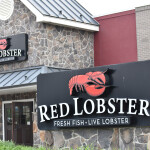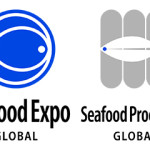While the United Kingdom’s departure from the European Union and the negotiation of a good severance package is the most immediate priority for the country’s seafood sector, a new vision will soon be laid out that is aimed at establishing a prosperous industry worth double its current value of GBP 6.2 billion (USD 8 billion, EUR 7.2 billion) within the next two decades.
Delivering the keynote presentation on the second day of the recent Shellfish Association of Great Britain (SAGB) 48th Annual Conference in London, Mike Mitchell, founder of the seafood consultancy business Fair Seas Ltd. and a member of the government-appointed Seafood Industry Expert Working Group, said that the 2040 Vision would help the country’s collective seafood economy see beyond the immediate horizon dominated by the “momentous” Brexit task, outlining strategies to help it reach its full potential.
“When faced with such a significant challenge, it’s difficult to have the luxury of a longer-term view, but it is important that we do, which is one of the reasons why we have continued to work on the 2040 Vision for the seafood industry – to help define and remind us of what good could look like if we act collaboratively toward shared and agreed objectives,” he said.
Mitchell has been part of the project for two years. It officially began with the establishment of a ministerial task force in October 2015 –predating the country’s Brexit referendum of June 2016 – to “explore the challenges and opportunities facing the English industry and shape a long-term ambition that can realize its potential.” This led to a consultation exercise across all sectors (November 2015) and a high level strategy that was submitted to the Department for Environment, Food & Rural Affairs (DEFRA) and published two months later. Then in May last year, Fisheries Minister George Eustice appointed a Seafood Industry Expert Group to progress the Seafood 2040 strategy.
The resultant 2040 action plan is built on three foundations: Collaboration; science and innovation; and working to best-practice, with the primary purpose to grow the demand by expanding markets and increasing consumption. A supporting aim on the supply side is to grow the resource availability to furnish that demand.
“Collaboration is essential,” Mitchell said. “The industry needs to work together to fully realize its potential; to ensure shared goals are agreed upon and a common strategy is pursued.”
As well as breaking down barriers to enable stakeholders to work closer together while helping increase consumption, having insight, expertise and robust science at the heart of all decision making will drive efficiency, profitability and innovation within the seafood industry, he said.
One way to help grow the market by a further GBP 6 billion (USD 7.7 billion, EUR 6.9 billion) is through the promotion of two seafood-based meals a week – a diet recommendation that is widely touted by numerous health agencies. Also, in addition to reinforcing the health and taste credentials of seafood, the industry should look to establish a more valued place for products in public procurement – such as in schools, hospitals, military commissaries, and other similar establishments, he said.
Another major growth prospect is through the promotion of “English” or “British” seafood as a brand, and to also use that regional or national provenance to drive a thriving export market – ramping up overseas value and volume.
“There is a very big prize there if we make the most of that opportunity,” Mitchell said. “If we are going to dare to dream that we will double the market by 2040, we need to grow the resource. We need to maximize our wild-catch opportunities through good stewardship of the fisheries that we have and also grow a profitable English aquaculture sector. We also need to ensure that U.K. buyers are competitive in the international raw material marketplace, because even with a maximized wild catch and a flourishing aquaculture sector, there still wouldn’t be enough to meet that huge demand.”
Other ways to grow the resource include supporting business growth and driving innovation across the entire supply chain, particularly with regards to reducing waste and optimizing the use of resources through the development of high-value co-products. It is also essential to develop port system infrastructure and capacity, ensure a responsible supply chain and establish a skilled workforce, he said.
A finalized action plan is to be submitted to authorities this summer and published publicly. So far it has been a three-way contribution between DEFRA, the U.K. Seafish Authority and industry, but the Seafood Industry Expert Group believes it provides a unique opportunity for all stakeholders to engage and together grow a thriving seafood economy.
“Surely there is a benefit to this,” Mitchell said. “We do have two years of fighting ahead of us, but lets not lose sight of this longer term vision. It would be a real shame if this was published and then just left on the shelf.”
While the 2040 Vision is by no means the first battle plan or wish list to have been drawn up for the U.K. seafood industry’s future, Mitchell maintains that this one is different and can deliver where previous plans had failed by providing strategies to overcome the historical barriers that have prevented projects from getting off the ground or over the line, particularly at a political level where government changes or resistance have put the brakes on a number of highly regarded initiatives.
“I think where we have gone wrong in the past is there hasn’t been any kind of legacy. The vision was identified and that was basically it. There was no strategy to deliver it. The hope and what I will be trying to work towards is that as this initiative draws to a close (with the delivery of the plan), the legacy will be some operational changes to help deliver some of these strategies,” he said. “It is going to be a challenge, but hopefully some value will come out of this. If nothing else, to break down some of those barriers and create some new multi-stakeholder platforms with shared views could be where we make a difference.”






